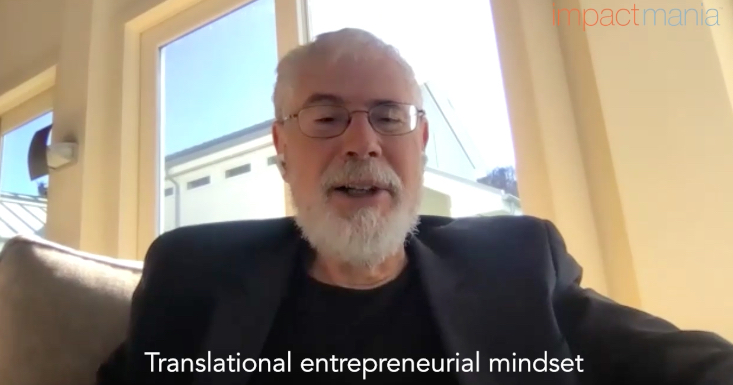Entrepreneur, author, educator, Steve Blank, changed how founders launch startups. Globally, entrepreneurs benefit from his customer development method which became the Lean Startup movement. Now Blank’s Lean LaunchPad class has become the standard for commercialization for federal research.
Steve Blank is seen as one of Silicon Valley’s Godfathers, an adjunct professor of entrepreneurship at Stanford and is a senior fellow at Columbia University.
impactmania’s Paksy Plackis-Cheng spoke with Steve Blank on March 23, 2021 for her partners at UC Santa Barbara, Messaggero Veneto Scuola, and startup accelerators.
Part 1 of 4.
For University Students
What are some specific steps to encourage more of what we do in academia — that matters to society — become successful in the marketplace?
Well, that’s a great question, and it’s one that I live with in the middle of Stanford. We really need a translational entrepreneurship kind of mindset, which we don’t have. There are a lot of smart academics doing some really insightful work on innovation and entrepreneurship and its effect on society, and the whole ecosystem around it.
But there’s very little incentive for them to communicate that to the practitioners. There’s a huge gap between the academics and the practitioners. I think some smart university is going to start a translational entrepreneurship group, working not only on translating their academic research, but maybe going through some of the best papers and pulling out useful things for practitioners.
And by practitioners, I mean people who actually start companies, or run accelerators, or run venture firms. There’s just a ton of great insights that never see the light of day because there’s no incentive. In fact there’s a negative incentive in academia for you to have practical work published.
All the incentives are oriented for you to get published in very specific academic journals, or magazines, or write texts that your peers or other researchers read.
Could you give me an example of something you did at Stanford that other universities could replicate?
I don’t think I’ve done a good job at doing this. However, I’ve taken some of the best practices from some of the papers I read, and embedded them into, for example, the Lean LaunchPad, I Corps, Hacking for Defense classes.
The way these classes are designed is based on great academic literature on the difference between directed learning and experiential learning. What are the common attention threads that need to go across a class if you’re doing experiential, whether you do non guided or guided learning? All that came from a lot of literature I read, and it matched my experiences as a practitioner.
It was not only nice to know there was some literature around it, but it allowed me to provide a frame and enhance it so it could become more effective. But boy, as I dug into that I realized there is 10,000 times more stuff.
That if there was a translational entrepreneurship…in fact, there’s a great startup [idea]. If someone wants to start a magazine, or publication, or something that was just simply, “Let’s read some research this week and come up with some new ideas,” somebody could probably make a lot of money doing that.
Is there a startup you can cite that has taken research that came out of academia and did a great job in commercializing it?
In technical research that happens all the time. One of my first startups in Silicon Valley was my second semiconductor chip company. It was done by a junior professor of computer science at Stanford who took a sabbatical to commercialize this chip he had done in his lab. The professor’s name was John Hennessy. He eventually became the president of Stanford 20 years later.
Silicon Valley was built on a series of technologies that left the lab. Cisco, etc, came out of research. And it’s not just Stanford. We commercialize tech fairly well out of university labs. In the United States, the Bayh–Dole Act allowing universities to profit from commercializing their inventions has led to almost every research university having a tech transfer office where they license their technology, and either make money on the license itself or on royalties from it.
It’s more prevalent in life sciences but occurs in hardware and software, etc.
I want to distinguish the technology ideas where that translation is pretty clear to an engineer. You look at something in the lab and go, “Yeah, OK, I could figure out how to make a company out of that.”
Versus the more obscure insights about customers, or about markets, or about dynamic market pricing, etc. It’s not that none of them make it out of research, but they’re a lot harder to translate, because those papers and the practice are just harder to see.
If the technology transfer officers were smart, they’d actually be doing this translational stuff and actually going through those types of papers.
Next week, part 2 of 4: Steve Blank on Public Service and Defining the Root of the Problem
The work of impactmania, a global content and community building initiative, have been cited in international media, a number of books published by Springer, Duke University Press, Cambridge Scholars Publishing, featured at the United Nations, and at U.S. Consulates. One of impactmania’s community building programs has been awarded with the U.S. Embassy Public Diplomacy Grant.
For more on original content and community building: www.impactmania.com.
